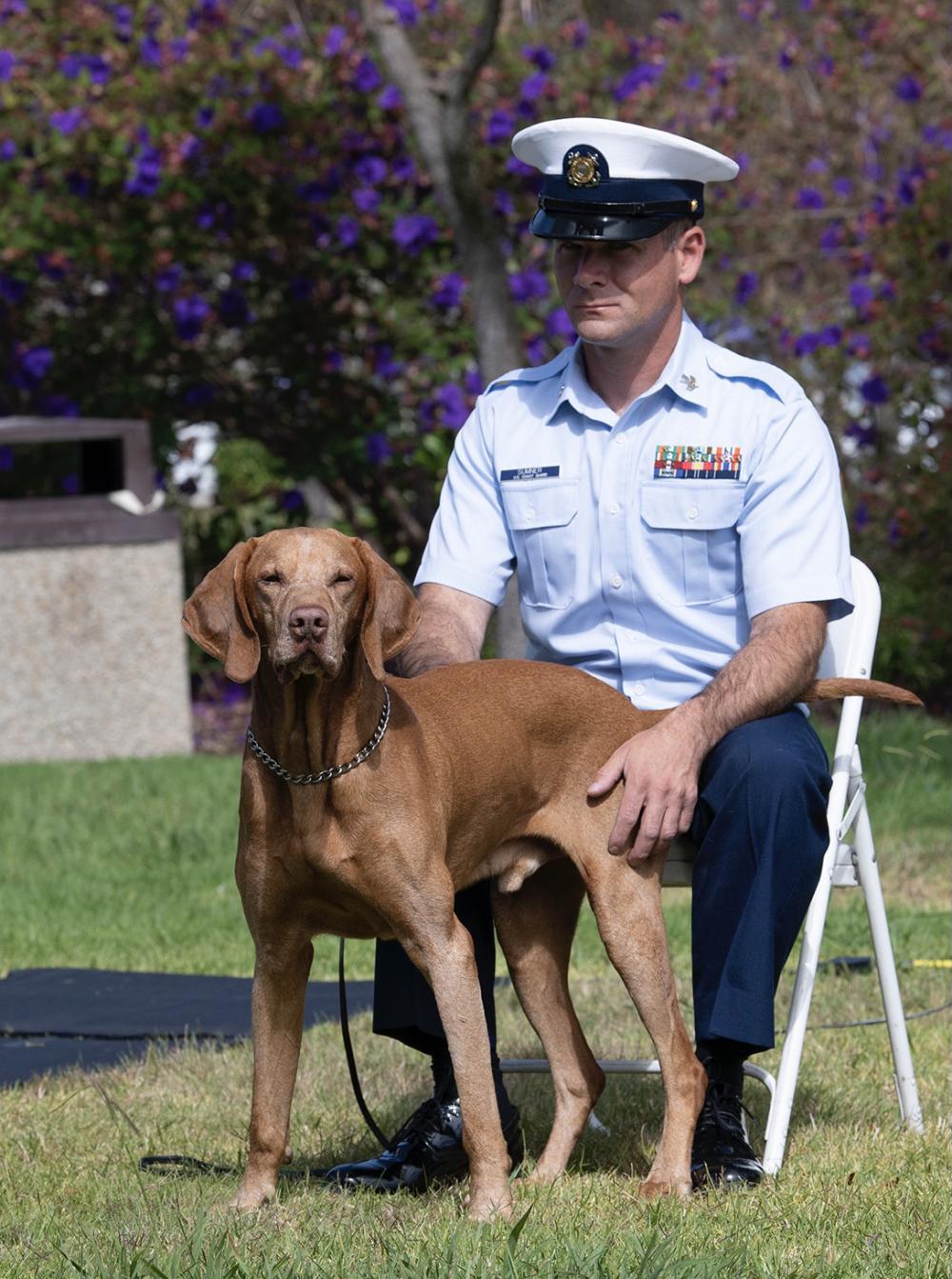Coast Guard military working dog retires, new program announced to cover retired Coast Guard K-9 veterinary care
U.S. Coast Guard sent this bulletin at 07/22/2022 05:41 PM EDT
| News Release |
July 22, 2022 |
Coast Guard military working dog retires, new program announced to cover retired Coast Guard K-9 veterinary care
Editors' Note: Click on images to download high resolution version.
ALAMEDA, Calif. — A Coast Guard military working dog was honored during a retirement ceremony Friday held by members of the Maritime Safety and Security Team (MSST) San Francisco on Base Alameda.
The ceremony marked Chief Petty Officer Feco’s retirement from the Coast Guard after eight years of distinguished service.
Feco, a nine-year old Hungarian Vizsla, joined the MSST San Francisco Canine Explosive Detection Team (CEDT) in 2014.
Petty Officer 1st Class Cory Sumner has served as Feco’s lead handler since 2014. Together, they have participated in and provided security for more than 1,500 events. Sumner said a highlight of Feco’s career was providing security for high-profile gatherings and protecting hundreds of thousands of lives at events including multiple NFL Super Bowls, Major League Baseball games, multiple Fleet Week engagements, golf tournaments and conducting security sweeps for heads of state including presidential and U.S. Supreme Court members’ motorcades.
Feco was presented the Animals in War and Peace Distinguished Service Medal earlier this year during a ceremony in Washington D.C. where members of Congress recognized and honored six animal heroes for their accomplishments in both war and peace during the second annual Animals in War and Peace Medal ceremony.
During Feco’s retirement ceremony, a representative from the Coast Guard Mutual Assistance, a 501(c)(3) organization, announced the creation of a new program. The Retired Working Animal Medical Expenses Grant will cover veterinary care, insurance costs and cremation for retiring Coast Guard working animals thanks to a gift from Maureen Manning in memory of her parents, Coast Guard Rear Adm. Alfred and Claire Manning and her own Vizsla Sandy.
“Affectionately known as the WAG program, Coast Guard Mutual Assistance will provide for the continued medical care of retired Coast Guard working dogs for their lifetime,” said Coast Guard Mutual Assistance Chief Development Officer Alena Howard. “CGMA is proud to support these important members of our community with this new program. Thank you Chief Feco and Petty Officer Sumner for your leadership and partnership in helping to make this program a reality!”
The Coast Guard has 18 CEDTs around the country consisting of a handler and a working dog per team.
Together, these teams provide security and safeguard key resources and critical infrastructure in and around major U.S. ports and during National Special Security Events. Their uses in both detection and as a deterrent make them integral components to the Department of Homeland Security’s counter terrorism efforts.
Coast Guard canines undergo a multi-month training regimen at the Transportation Security Administration’s National Explosives Detection Canine Program on Joint Base San Antonio before being matched with their handlers. The training program is the largest explosives detection canine program in the Department of Homeland Security. These highly trained explosives detection canine teams are a reliable resource at detecting explosives and provide a visible deterrent to terrorism. Feco learned to detect 25 different odors that could signal a potential threat to the public during his 15 weeks of training before being matched with Sumner.
“Even when faced with adversity, Feco always did his job,” said Sumner who will be adopting Feco following his retirement. “When he had a fungal infection and the two options were to put him down or get surgery that could kill him, Feco made it through the surgery, then passed three required evaluations to remain certified and continued serving our country.”
-USCG-




